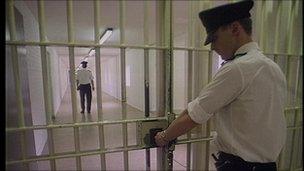Women offenders strategy released by Department of Justice
- Published

3% of the Northern Ireland prison population is female
The Department of Justice has published its first strategy for managing female offenders in Northern Ireland.
The Strategy to Manage Women Offenders and those Vulnerable to Offending Behaviour, external is designed to address the root problems behind women offending.
It is intended to "reshape the justice system" to better cater to different needs of male and female offenders.
By providing support and interventions for women it is hoped that the number imprisoned or re-offending can be cut.
At 3% of the prison population the number of female offenders in Northern Ireland is disproportionately small compared to the rest of the UK and most of Western Europe.
Due to the small number of women in custody, the prison system here is designed mainly with men in mind and the strategy notes that women prisoners suffer much more hardship than men as a result.
The strategy also states that women are much more likely than men to be primary care givers to children and its recommendations have been drawn up with this in mind.
Prime motivators
Justice Minister David Ford said: "Only a small proportion of offenders in Northern Ireland are women but their offending behaviour can have a huge impact on their children and families.
"If we are serious about reducing crime and making our communities safer, then we must be imaginative in how we reduce offending. This strategy, which is supported by the statutory, community and voluntary sectors, will deliver help for women offenders and those at risk of offending."
Women offenders have also been identified in the document as disproportional suffering from mental health problems, addiction, poverty, homelessness, abuse and domestic violence compared to male offenders.
These issues are cited as the "prime motivators for a woman's involvement in crime".
Mr Ford said that to reduce offending, the justice system needed to find ways to tackle these causes in the community rather than through the penal system.
"Implementing this strategy will allow women to take responsibility for their own lives, lift them out of the justice system and contribute to reducing crime and make the community safer," he said.